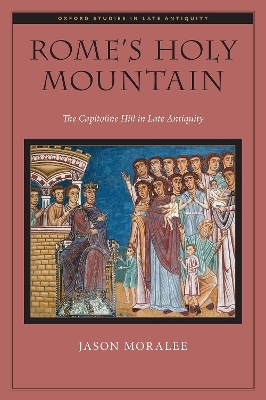
Rome's Holy Mountain
Seiten
2021
Oxford University Press Inc (Verlag)
978-0-19-754071-8 (ISBN)
Oxford University Press Inc (Verlag)
978-0-19-754071-8 (ISBN)
Rome's Holy Mountain is the first book to chart the history of the Capitoline Hill in Late Antiquity, from the third to the seventh centuries CE. It investigates both the lived-in and dreamed-of realities of the hill in an era of fundamental political, religious, and social change.
Rome's Capitoline Hill was the smallest of the Seven Hills of Rome. Yet in the long history of the Roman state it was the empire's holy mountain. The hill was the setting of many of Rome's most beloved stories, involving Aeneas, Romulus, Tarpeia, and Manlius. It also held significant monuments, including the Temple of Jupiter Optimus Maximus, a location that marked the spot where Jupiter made the hill his earthly home in the age before humanity. This is the first book that follows the history of the Capitoline Hill into late antiquity and the early middle ages, asking what happened to a holy mountain as the empire that deemed it thus became a Christian republic. This is not a history of the hill's tonnage of marble and gold bedecked monuments, but rather an investigation into how the hill was used, imagined, and known from the third to the seventh centuries CE. During this time, the imperial triumph and other processions to the top of the hill were no longer enacted. But the hill persisted as a densely populated urban zone and continued to supply a bridge to fragmented memories of an increasingly remote past through its toponyms. This book is also about a series of Christian engagements with the Capitoline Hill's different registers of memory, the transmission and dissection of anecdotes, and the invention of alternate understandings of the hill's role in Roman history. What lingered long after the state's disintegration in the fifth century were the hill's associations with the raw power of Rome's empire.
Rome's Capitoline Hill was the smallest of the Seven Hills of Rome. Yet in the long history of the Roman state it was the empire's holy mountain. The hill was the setting of many of Rome's most beloved stories, involving Aeneas, Romulus, Tarpeia, and Manlius. It also held significant monuments, including the Temple of Jupiter Optimus Maximus, a location that marked the spot where Jupiter made the hill his earthly home in the age before humanity. This is the first book that follows the history of the Capitoline Hill into late antiquity and the early middle ages, asking what happened to a holy mountain as the empire that deemed it thus became a Christian republic. This is not a history of the hill's tonnage of marble and gold bedecked monuments, but rather an investigation into how the hill was used, imagined, and known from the third to the seventh centuries CE. During this time, the imperial triumph and other processions to the top of the hill were no longer enacted. But the hill persisted as a densely populated urban zone and continued to supply a bridge to fragmented memories of an increasingly remote past through its toponyms. This book is also about a series of Christian engagements with the Capitoline Hill's different registers of memory, the transmission and dissection of anecdotes, and the invention of alternate understandings of the hill's role in Roman history. What lingered long after the state's disintegration in the fifth century were the hill's associations with the raw power of Rome's empire.
Jason Moralee is Associate Professor of History at University of Massachusetts Amherst.
List of Figures
Abbreviations
Acknowledgments
A Note on Names
Prologue
Introduction
Part I: Lived-In Realities
Chapter 1: Climbing the Capitoline Hill
Chapter 2: Living and Working on the Capitoline Hill
Chapter 3: Christianity, the Capitoline Hill, and the End of Antiquity
Part II: Dreamed-Of Realities
Chapter 4: Experiencing and Remembering the Capitoline Hill
Chapter 5: Learning From the Capitol's Deliverance
Chapter 6: Learning from the Capitol's Destruction
Chapter 7: The Capitol and the Legends of the Saints
Epilogue: The Fall of the Ancient Capitol
Bibliography
Index
| Erscheinungsdatum | 26.01.2021 |
|---|---|
| Reihe/Serie | Oxford Studies in Late Antiquity |
| Zusatzinfo | 32 (b&w line art and halftones) |
| Verlagsort | New York |
| Sprache | englisch |
| Maße | 236 x 157 mm |
| Gewicht | 454 g |
| Themenwelt | Geisteswissenschaften ► Archäologie |
| Geisteswissenschaften ► Geschichte ► Allgemeines / Lexika | |
| Geschichte ► Allgemeine Geschichte ► Vor- und Frühgeschichte | |
| Geschichte ► Allgemeine Geschichte ► Altertum / Antike | |
| ISBN-10 | 0-19-754071-6 / 0197540716 |
| ISBN-13 | 978-0-19-754071-8 / 9780197540718 |
| Zustand | Neuware |
| Informationen gemäß Produktsicherheitsverordnung (GPSR) | |
| Haben Sie eine Frage zum Produkt? |
Mehr entdecken
aus dem Bereich
aus dem Bereich
Was Pompeji über uns erzählt
Buch | Hardcover (2023)
Propyläen (Verlag)
CHF 44,75
auf den Spuren der frühen Zivilisationen
Buch | Hardcover (2023)
C.H.Beck (Verlag)
CHF 27,95


